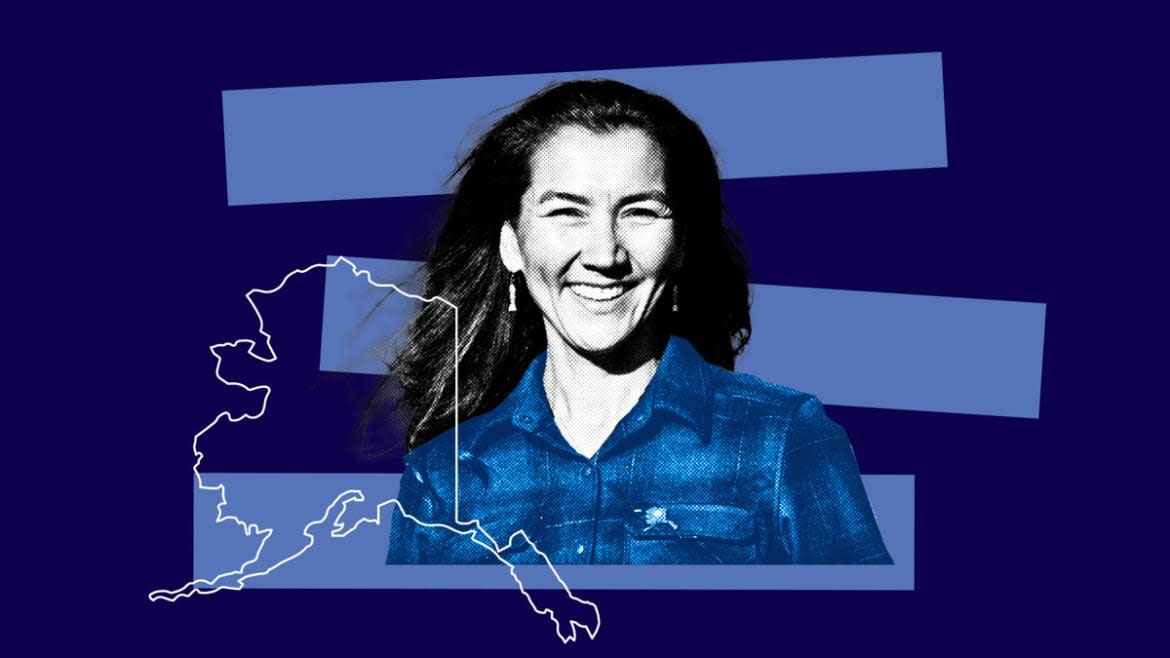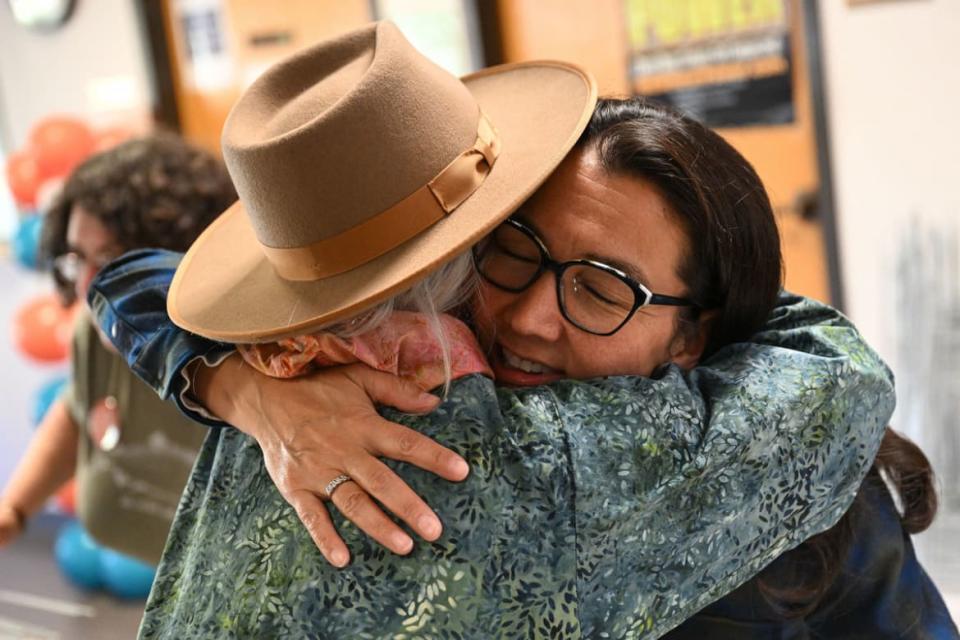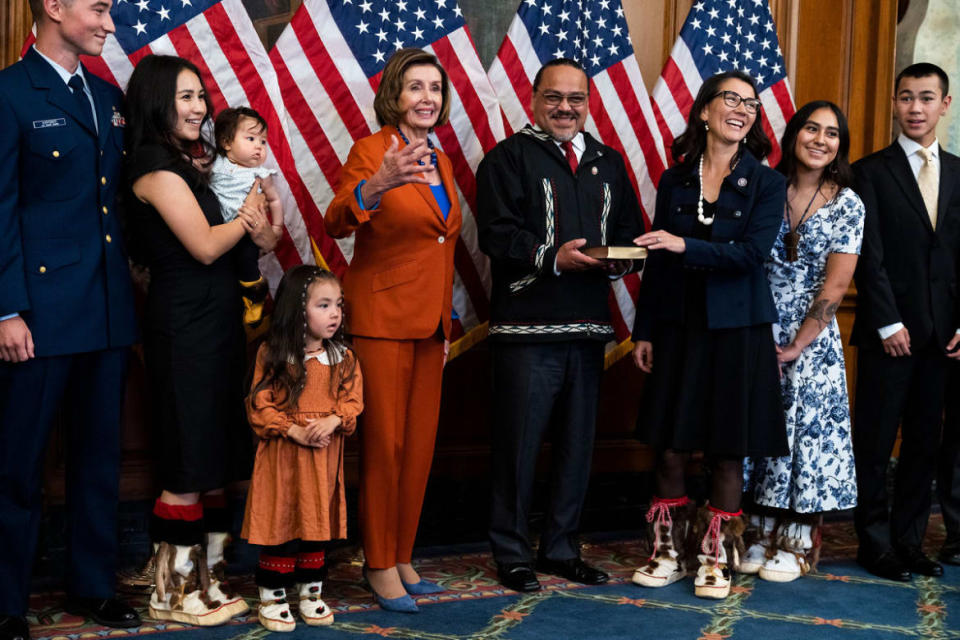How a Democrat Won a State With Just 12% Dem Voters

- Oops!Something went wrong.Please try again later.
ANCHORAGE, Alaska—When Rep. Mary Peltola, the first Alaska Native ever elected to Congress, stepped onstage Thursday at the year’s biggest meeting of Alaska Natives, an audience of thousands clapped, cheered, and waved fans with Peltola’s face on them.
But that still didn’t seem like an adequate reception. So the crowd sang.
First, they sang a hymn of the Russian Orthodox Church—of which Peltola and many Alaska Natives are members—called “May God Grant You Many Years,” in Russian, English, and Yupik. Then, they sang an Inupiat language song, “Aarigaa,” which is meant to convey gratitude and appreciation.
On stage, Peltola stood hand over her heart, as members of the crowd dabbed tears from their eyes. Several attendees remarked, in their years of attending the Alaska Federation of Natives Convention, that this reception was unprecedented.
For Alaska Natives, who comprise nearly 20 percent of the state’s population but have been historically marginalized, the significance of seeing a Yupik woman from rural western Alaska ascend to Congress was hard to put into words.
How a ‘Ludicrous’ Sarah Palin Feud Could Hand Alaska to Democrats
“It’s overwhelming, I guess,” Dustin Carl, a 31-year old biologist and Alaska Native, told The Daily Beast. “I’ve never seen someone that’s part of your community, that looks like you, up in Washington.”
It can be hard for Peltola to put that feeling into words, too. “It can be overwhelming,” she said in an interview. “It feels good, but I don't even know how to explain it. It's strange, because I'm just a very normal person and have had a very normal Alaskan lifestyle and experience.”
That was perhaps true before Peltola won a shocking upset in an August special election, in which she defeated former Gov. Sarah Palin to serve the rest of the late Rep. Don Young’s term. Now, it’s safe to say that Alaska, or Washington, has never seen a figure quite like her.
It’s not just that she’s the first Alaska Native elected to Congress, or that she’s the first Democrat to represent Alaska in the U.S. House since the Nixon administration.
In her special election win, and in her current campaign to win a full two-year term in November, Peltola has crafted a platform—“pro-fish, pro-family, pro-freedom”—that is a fit for this idiosyncratic state but may look utterly alien to observers outside it.
Like many Democrats in 2022, when Peltola talks about preserving freedoms, she is talking about protecting abortion access. But in the same breath, she’ll talk about protecting gun rights, too.
Peltola is an ardent supporter of organized labor, but also backs resource-extracting projects that other Democrats may blanch at. She is a proud Democrat in a state where just 12 percent of voters are Democrats, but she’s also run online ads putting her in league with the state’s GOP senators, Lisa Murkowski and Dan Sullivan, in putting pressure on President Joe Biden.

Rep. Mary Peltola (D-AK) hugs a supporter during a campaign event at the International Brotherhood of Electrical Workers (IBEW) Local 1547 in Anchorage, Alaska on Sept. 17, 2022.
But it’s the “pro-fish” part of Peltola’s slogan that may be the most important. She made management of Alaskan salmon stock a cornerstone of her campaign—perhaps her greatest similarity with her predecessor, Don Young, the salty Republican who is the longest serving GOP member of the House of all time. Helping Alaskan salmon, and blocking farm-raised fish—what Alaskan politicians like to call “Frankenfish”—an issue of not only cultural significance but survival to thousands of Alaskans who depend on salmon for livelihoods and for food.
That kind of focus on local issues of deep importance to Alaskans, most of which exist beyond partisan politics, has allowed Peltola to position herself as an heir to Young, who won over bipartisan coalitions through decades of relentlessly bringing home the bacon for Alaska.
Their connection was solidified at the convention on Thursday, when members of Young’s family—many of whom have endorsed Peltola—came onstage to give her something precious: his old bolo tie. Alaska political observers noted the gesture immediately; some joked the race ended right then and there.
Of course, Peltola repeating her upset win in November is not assured. But the same conditions are there: she again faces Palin and another Republican candidate, Nick Begich, who have both spent the entire campaign harshly attacking each other. Under Alaska’s system of ranked choice voting, constituents list all candidates in order of preference, and their second choices win their votes if their first choices do not make it past the initial round of balloting.
In this campaign, Palin has warmly and publicly praised Peltola and urged her supporters not to rank Begich—a dynamic that allowed the Democrat to pick up many second-round votes in the special election and defeat Palin.
At this point, many who have watched Peltola have learned not to bet against her. Joelle Hall, president of the Alaska AFL-CIO, recalled Peltola’s first campaign in the state legislature, in which she came from out of nowhere to defeat an incumbent—while eight months pregnant, no less.
“The story of Mary is,” Hall said, “she’s the upset.”
If Peltola wins yet another upset, it won’t necessarily mean Alaska is turning blue, even if it would mean that Democrats steal a red-state seat and stem their losses elsewhere on the national House map. Nevertheless, many Democrats in Washington will surely be looking hard at Peltola to figure out how they can replicate her playbook to compete in purple and red districts nationwide.
Asked what Democrats elsewhere could learn from her campaign, Peltola offers clear answers. They’re just difficult to export anywhere else.
First, Peltola’s campaign has been relentlessly positive. She has declined many chances to tee off against her Republican opponents, or their agenda, or the national stakes of GOP control of Congress. Voters, she says, are just tired of the fighting.

Rep. Mary Peltola, D-Alaska, third from right, along with her family, participates in a swearing-in ceremony with Speaker of the House Nancy Pelosi, D-Calif., in the U.S. Capitol on Sept. 13, 2022.
“We can all learn from having the discipline not to personally attack the other candidates,” she said. “I think that there has been a perception of me as weak, or dumb, or naive, because I am not interested in bashing the other candidates… I’m not interested in that. I want to talk about ideas.”
What voters might be more tired of, Peltola adds, is “canned messaging”—or, talking points rooted in national politics. “We’re tired of processed food,” she said. “We underestimate voters, I think we underestimate our citizenry when we talk down to them with this canned garbage.”
Those lessons are simple enough, but it is possible that only someone like Peltola, running in a system like Alaska’s, could find success with them.
For one, the ranked-choice voting system is designed to reward candidates that appeal to the broadest swath of the electorate. In the special election, Peltola’s moderate, hyper-local focus won over supporters of Begich’s who were happy to rank her, not Palin, second. Alaska also has open primaries, where the top vote-getters advance to the general election, regardless of party.
Peltola is candid about the system’s impacts. “I would not have been elected if we had had a closed partisan primary,” she said. “I would not have been elected because I am not liberal enough, I’m not left leaning enough, to have made it out of a closed primary.”
And while Peltola extols the virtues of the positive campaign, she never had a need to go negative—because Palin and Begich were all too happy to go negative on each other. At the same time, some Alaskans say Peltola’s positive campaign worked because voters simply felt that she was, well, genuinely positive.
“She has something that a lot of people don’t have, and I think that’s why she’s been able to run a positive campaign,” said Kim Hays, the political director of the Alaska AFL-CIO. “It’s authentic. I don’t think you can take that and just copy and paste it somewhere else. I think it’s specific to Mary.”
So, when Peltola compliments Palin, it does not come across as calculating. The two served together in the state capitol when both were pregnant and became fast friends. “I love being in the race with her and there is camaraderie,” Peltola says.
For someone who achieved a historic upset from out of nowhere—both nationally and in Alaska—it’s fair to say that expectations for Peltola are rising by the day. And there is still plenty of skepticism about her and her platform. Few things in Alaska are more controversial than fishing issues, and Peltola’s “pro-fish” platform is facing increased scrutiny from the industry and its stakeholders, the Anchorage Daily News reported.
Sarah Palin Loses Special Election for U.S. House Seat to Democrat Mary Peltola
If she wins a full two-year term, Peltola is also certain to face partisan tests that could put her at odds with her party and national Democratic donors, who have dramatically soured on centrists like Sen. Joe Manchin (D-WV) as they rejected aspects of Biden’s agenda.
“Mary will undoubtedly be, inside the Democratic caucus, a very conservative member,” said Hall, of the AFL-CIO. “But I think it’s important for the Democratic Party to understand that there are Democrats who live outside of the coasts of America… those people have real problems, and they have their own relationships with things.”
Alaska, too, remains a state that Donald Trump won twice by comfortable margins. And Alaska Natives are hardly a monolith of Peltola fans: on Thursday, after Peltola spoke, one man in a “Let’s Go Brandon” hat stood in the back of the auditorium. He only wanted to identify himself to The Daily Beast as Tony and said he was from Bristol Bay, on the state’s west coast.
Asked about his views on the House race, Tony said his choice was “anybody but Peltola” and “we don’t need Pelosi in there anymore, enough is enough.” He also took issue with the Democrat’s pro-abortion rights stance, saying, “we don’t support abortion, not in our culture.”
Among Peltola’s supporters in the Alaska Native community, however, the sense of possibility that she represents is a new feeling. State Rep. Tiffany Zulkosky, an Alaska Native, represents the rural western Alaska seat in the legislature that Peltola once did. In a state where seemingly everyone is connected, the two have an unusual bond: Peltola babysat Zulkosky as a child.
For her, and so many other young Native Alaskans, there is power in seeing Peltola in the halls of power in Washington. Her ascent, combined with other breakthroughs for indigneous people nationwide—like the success of the TV show Reservation Dogs—is “kicking the door open for a new generation of Native people,” Zulkosky said. “That’s been a quiet hum, but it is building, and it has a cadence.”
When asked how she responds to the hope so many young Alaska Natives have in her, Peltola quickly pivoted. “It’s not just Alaska Natives,” she said. “I get feedback from people of every ethnicity and people from all walks of life.”
It may have been Peltola’s introductory speaker, AFN co-chair Ann Hoffman, who expressed the feeling most eloquently. In her speech, she compared Alaska Natives to a school of salmon, who find strength and power in unity, and always return home.
“For all of us here, there is comfort and confidence in knowing wherever Congresswoman Peltola goes, whatever she does, she will intuitively find her way home,” Hoffman said. “Representative Peltola’s presence and work in Congress is part of her journey, her evolution, and this part has only just begun.”
Get the Daily Beast's biggest scoops and scandals delivered right to your inbox. Sign up now.
Stay informed and gain unlimited access to the Daily Beast's unmatched reporting. Subscribe now.

